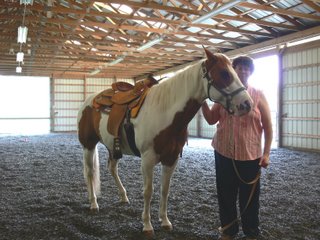Overcoming Fears

It "don't come natural" to everyone ... horseback riding, that is. And just because it takes some effort, time, and work doesn't mean you won't end up being a good rider.
As adults, we're used to being "in control". We turn our steering wheel to the right, Mr. Car goes right. We press the brake pedal, Mr. Car stops. We're strapped securely in our seats, protected by a reinforced metal frame with the added security of air bags. Mr. Car doesn't have a brain. He goes where we want, when want, and how fast we tell him to.
Not always so with Mr. Horse.
Where the hell is the brake pedal on this horse? Why does he go straight when I'm asking him to go right? Why does he go "up " when I'm asking him to back? And who asked him to do that fancy little hop/lope/stumble Cha-Cha-Cha dance step to the left when he saw that silly little butterfly flutter past his face?
Geez, I'm awfull high up, further than I expected. I'm nervous and this is a little bit scary. He's an AWFUL BIG animal and it looks like it would be an AWFUL BIG fall to the ground below.
I can't find the seatbelt - closest thing I've got is the saddle horn to hang onto for dear life. Hmm, don't seem to be any airbags up here either. And reinforced metal frame? Ha, how about air and gritty sandy arena floor instead?
Is it any wonder many adults have a love of horses but a fear of riding? As an inexperienced rider you have very little experience and control over the horse, and believe me, that horse knows it and will use it to his full advantage!!
But don't give up. It may take time, but be patient. You can overcome that fear and anxiety and grow into a good rider and horseman. Here are a few things that helped me along...
1. A PATIENT PERCEPTIVE RIDING INSTRUCTOR.
You need someone who recognizes your fears, is patient helping you through them, but is perceptive enough to know when to push you to advance further.
2. GROUND WORK, GROUND WORK, GROUND WORK.
This includes grooming, longing, leading, backing, desensitizing, and worming your horse. All things that can be done from the safety of the ground. Becoming familiar and comfortable with your horse (and yourself) from the safety of the ground is essential!! You'll be establishing a relationship with and learn control over your horse. If you haven't learned to control your horse from the ground, how can you expect to control him under saddle? YOU are his herd leader - teach him this before you get into the saddle. Have your instructor help you with this and incorporate it into your lessons. It's a confidence booster.
3. WHEN IN SADDLE, PRACTICE ON THE LONGE LINE FIRST.
Your instructor will be able to control the horses speed and some of those "naughty" outbursts that they are prone to have. Do "circle" and "scissors" with your arms to develop a feel for being in the saddle and to develop balance. Progress to riding with your feet out of the stirrups while on the longe line. When you are ready to advance to another gait, again go back to doing your initial lesson on the longe line. YOU'LL feel safer. And don't worry, it won't be long before you won't need it anymore. It's a good tool to go back to periodically as your instructor sees fit.
4. WHAT'S WRONG WITH THE WALK?
There are plenty of things you and your horse can learn at the walk. So what if your sister-in-law is loping across open fields? Progress your gaits at a pace that YOU feel comfortable and in control with. Why risk a catastrophe and increased anxiety trying to keep up with others?
5. EMERGENCY DISMOUNTS.
Great way to become comfortable with your horse in general. And it gives you a sense of security knowing if something were to go wrong (and it eventually will), you will be prepared to safely and quickly dismount if needed. Have your instructor "coach" you through this. Start each lesson with 6-8 of these, until you feel real secure. Periodically go back and practice them again.
6. EMERGENCY STOPS.
When appropriate, have your instructor teach you the "one rein stop". It is the "emergency brake" to use when your horse is out of control or "spooking" on you. It is a safe, secure way to regain the horses attention and your control over her. Again, it will help YOU feel safer and better prepared to handle emergencies that arise.
7. WHOA.
If your horse is "sloppy" with his stops, immediately go back and work on this. Your instructor or trainer can help you. You will relax if you feel confident that when you tell your horse "whoa", he does just that. It makes you feel secure and confident to know that if you are feeling "out of control" or "uncomfortable" with a drill, your horse will listen when you ask him to change gaits or to stop.
These are just a few tips to try to help overcome your fears. Hang in there, take it slow and comfortable, seek the guidance of a good, patient riding instructor. Instead of giving up and running away, you WILL overcome your fears and "keep on riding"!

2 Comments:
This comment has been removed by a blog administrator.
Thanks, that is really nice.
I gave the overcoming fear some additional thought, and I added a post to my blog titled "In The Zone" it's an additional thing we all should do, and it makes a world of difference.
http://professionalhorse.blogspot.com/2006/08/in-zone.html
Post a Comment
<< Home